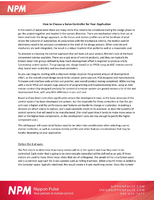GE Signs Strategic Agreement to Support U.S. Exports and Jobs
Share:
Joint Collaboration with China Huadian Corporation will Spur Deployment of Combined Heat and Power Energy Solutions
WASHINGTON - 18 January 2011 - GE (NYSE: GE) and China Huadian Corporation today signed a five-year, joint collaboration agreement for distributed energy combined heat and power (DECHP) projects in China that is expected to boost U.S. exports and support thousands of U.S. jobs. The agreement was announced on the eve of Chinese President Hu Jintao's state visit to the United States.
GE anticipates that at least 50 gas turbine generator sets will be sold and installed in China, resulting in $500M of total revenue for the collaboration. Of that amount, approximately $350M is estimated in U.S. exports. In addition, according to the U.S. Department of Commerce, the agreement could support approximately 2,100 U.S. jobs and provide new opportunities for further job growth in both countries.
"This strategic agreement is a win for the American economy, American exports and American jobs," said Darryl Wilson, vice president-aeroderivative gas turbines for GE Power & Water. "The agreement further represents another example of GE's continued commitment to investing in progressive solutions to meet the energy needs of the future and address environmental challenges throughout the world."
As a key component of distributed energy, combined heat and power (CHP) offers a cost-effective opportunity to improve the environment and economy. CHP significantly reduces CO2 emissions through greater energy efficiency and has the ability to relieve grid congestion. It also reduces business costs and allows for potential job creation.
The use of DECHP will be the most efficient use of natural gas in China and will be a significantly cleaner alternative to the higher greenhouse gases from coal-fired power plants.
"The Chinese government has decided to promote the country's DECHP market development, and China Huadian Corporation plays an important role in advancing that initiative," said Xianming LIU, general manager of CHEC New Energy Technology Development Co., an affiliated enterprise of China Huadian Corporation.
"DECHP technologies produce both electricity and useful thermal energy from a single fuel at a facility located near the consumer," LIU said. "These efficient systems recover heat that normally would be wasted in an electricity generator and save the fuel that would otherwise be used to produce heat or steam in a separate unit. By collaborating with GE, a leader in DECHP applications worldwide, we feel this will be a significant step in the right direction for meeting our DECHP goals and will benefit China's environment and economy."
GE has had great success with CHP. For example, in August of 2010, the company announced that one of its aeroderivative gas turbines, developed with the same reliability, efficiency and emissions technology that powers many of the world's aircraft, is now powering one of the world's largest medical centers. Thermal Energy Corporation (TECO) announced the completion of its first CHP plant at the Texas Medical Center in Houston, Texas. The CHP facility uses a GE LM6000 PD Sprint® aeroderivative gas turbine to provide 48 megawatts of power. The turbine exhaust also is used to generate steam for the physical plant at the medical facility.
TECO's highly efficient CHP plant will reduce CO2 emissions by approximately 305,455 tons per year more than would be the case if the heat and power were purchased separately off the grid-the equivalent of removing 53,000 U.S. cars off the roads.
Today's announcement of the collaboration between China Huadian Corporation and GE is part of a larger-scale commitment GE has made to China. Most recently, on January 5, 2011, GE announced that it had signed a contract with Jiangsu Tianue Energy & Chemical Group Co. Ltd, which is building a high-efficiency gas turbine power plant to utilize industrial dismissed gas into power and steam to meet increasing energy needs in the region. The power plant will be equipped with three GE (NYSE: GE) aeroderivative gas turbines, which are the first LM2500+G4 units sold in China. GE's aeroderivative gas turbines will use coke oven gas as fuel and turn it into electricity for the region.
On November 9, 2010, GE announced plans to invest more than $2 billion into its efforts in China through 2012 to help tackle the country's pressing energy and infrastructure needs. GE Chairman and CEO Jeff Immelt announced that the company plans to commit $500 million to enhance China R&D capabilities and establish new Customer Innovation Centers to better serve west, north, central and south China.
On that same day, as part of the $2 billion investment, GE and State Grid Corporation of China (SGCC), China's top power distributor and one of the world's largest utilities, announced plans for several joint ventures to address China's growing energy needs and to electrify its vast transportation infrastructure. These joint ventures will play a vital role in supporting the country's energy demand through the development of a smarter grid that will help achieve environmental and economic goals.
About GE
GE (NYSE: GE) is a diversified infrastructure, finance and media company taking on the world's toughest challenges. From aircraft engines and power generation to financial services, health care solutions and television programming, GE operates in more than 100 countries and employs about 300,000 people worldwide. For more information, visit the company's website at www.ge.com.
GE serves the energy sector by developing and deploying technology that helps make efficient use of natural resources. With nearly 85,000 global employees and 2009 revenues of $40 billion, GE Energy www.ge.com/energy is one of the world's leading suppliers of power generation and energy delivery technologies. The businesses that comprise GE Energy-GE Power & Water, GE Energy Services and GE Oil & Gas-work together to provide integrated product and service solutions in all areas of the energy industry including coal, oil, natural gas and nuclear energy; renewable resources such as water, wind, solar and biogas; and other alternative fuels.
Media contacts:
GE news
Masto Public Relations
Email: information@mastopr.com




